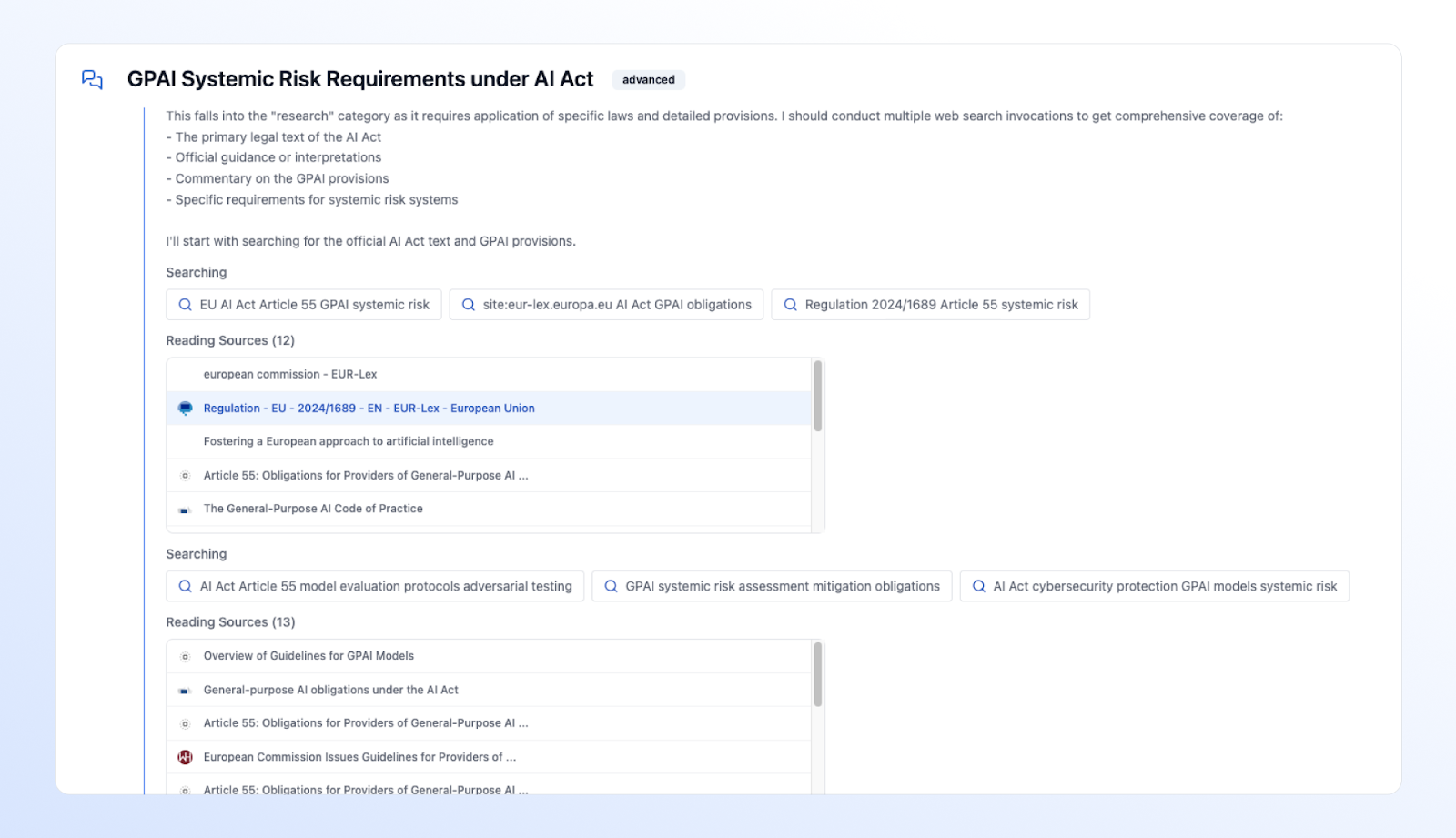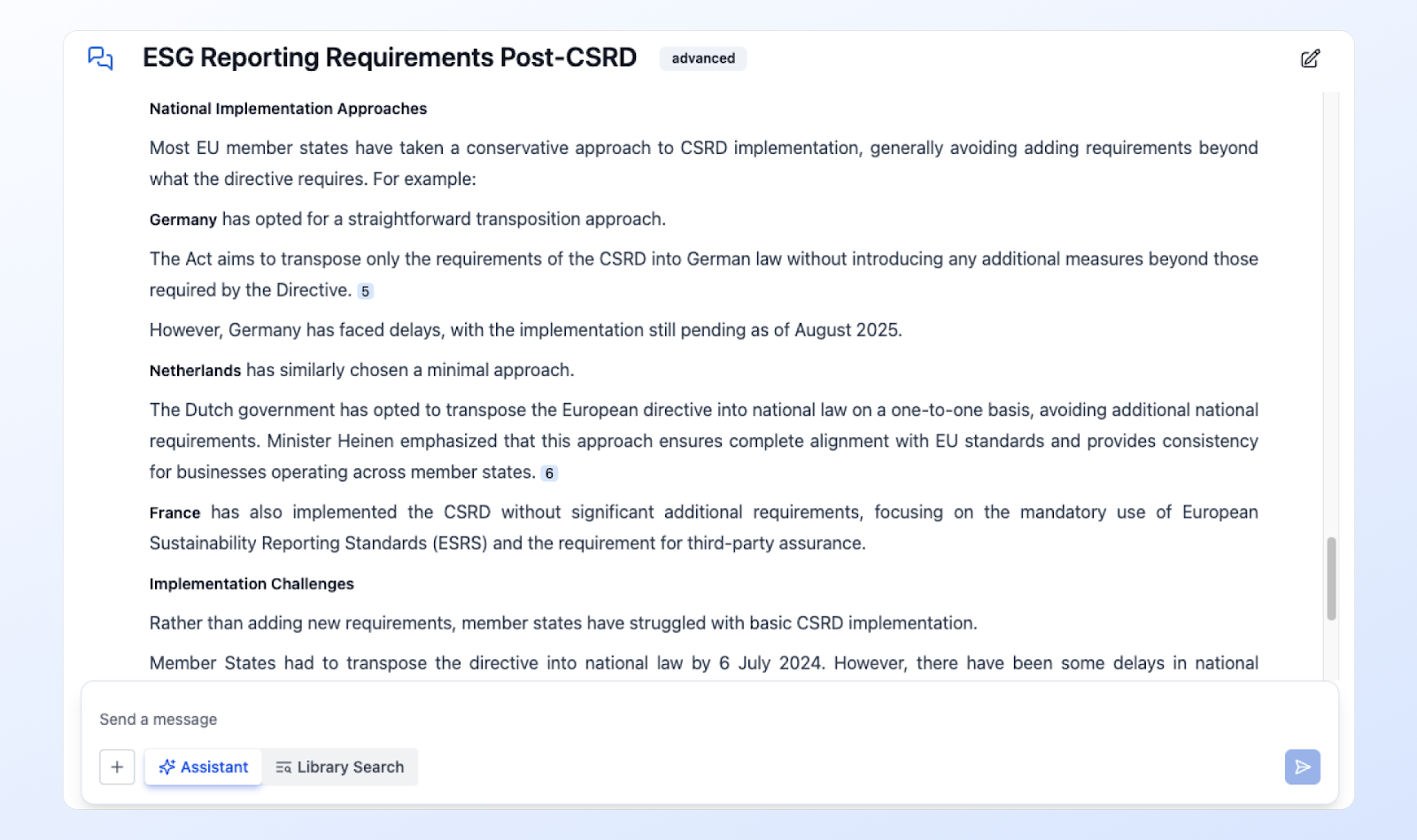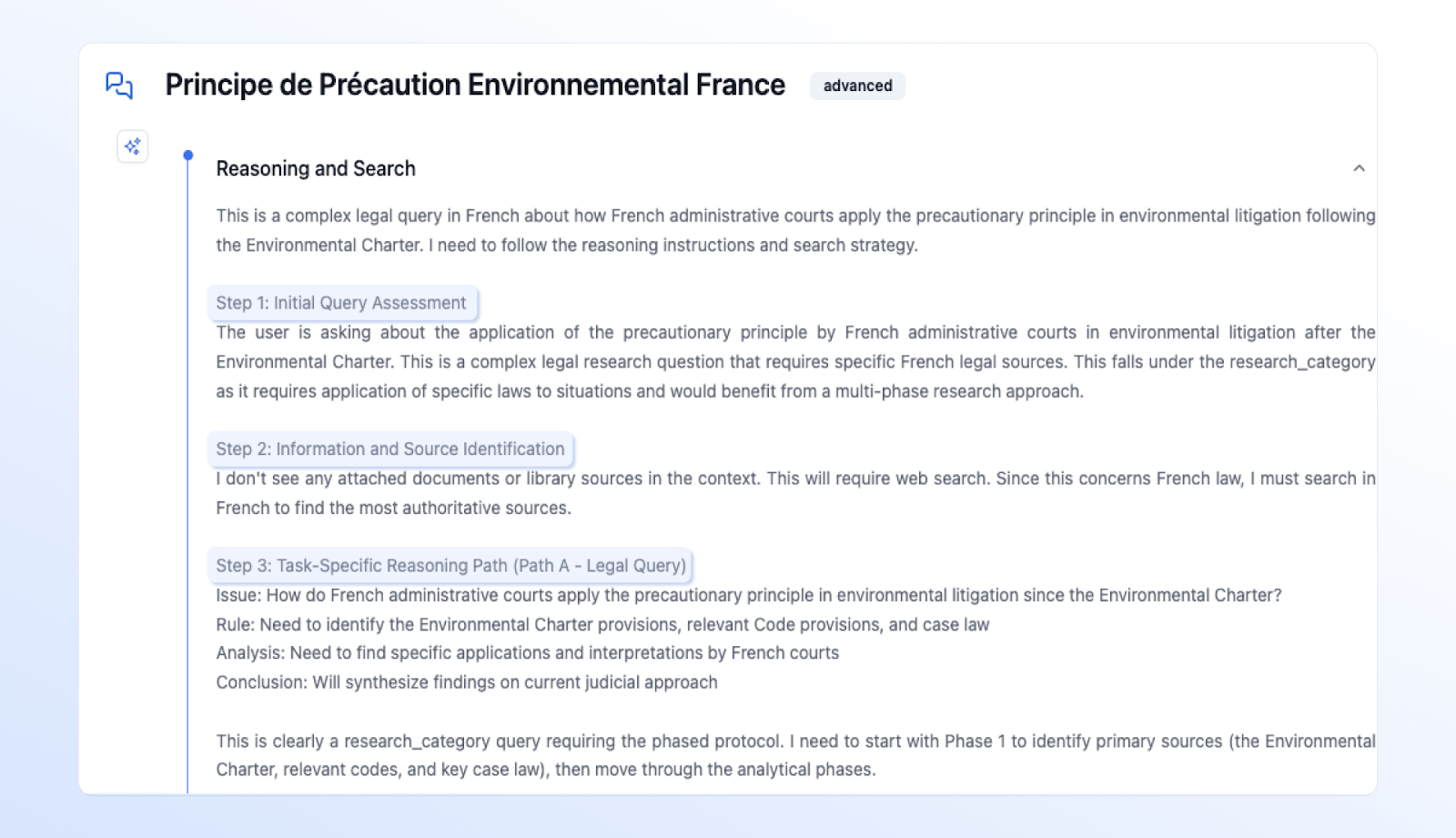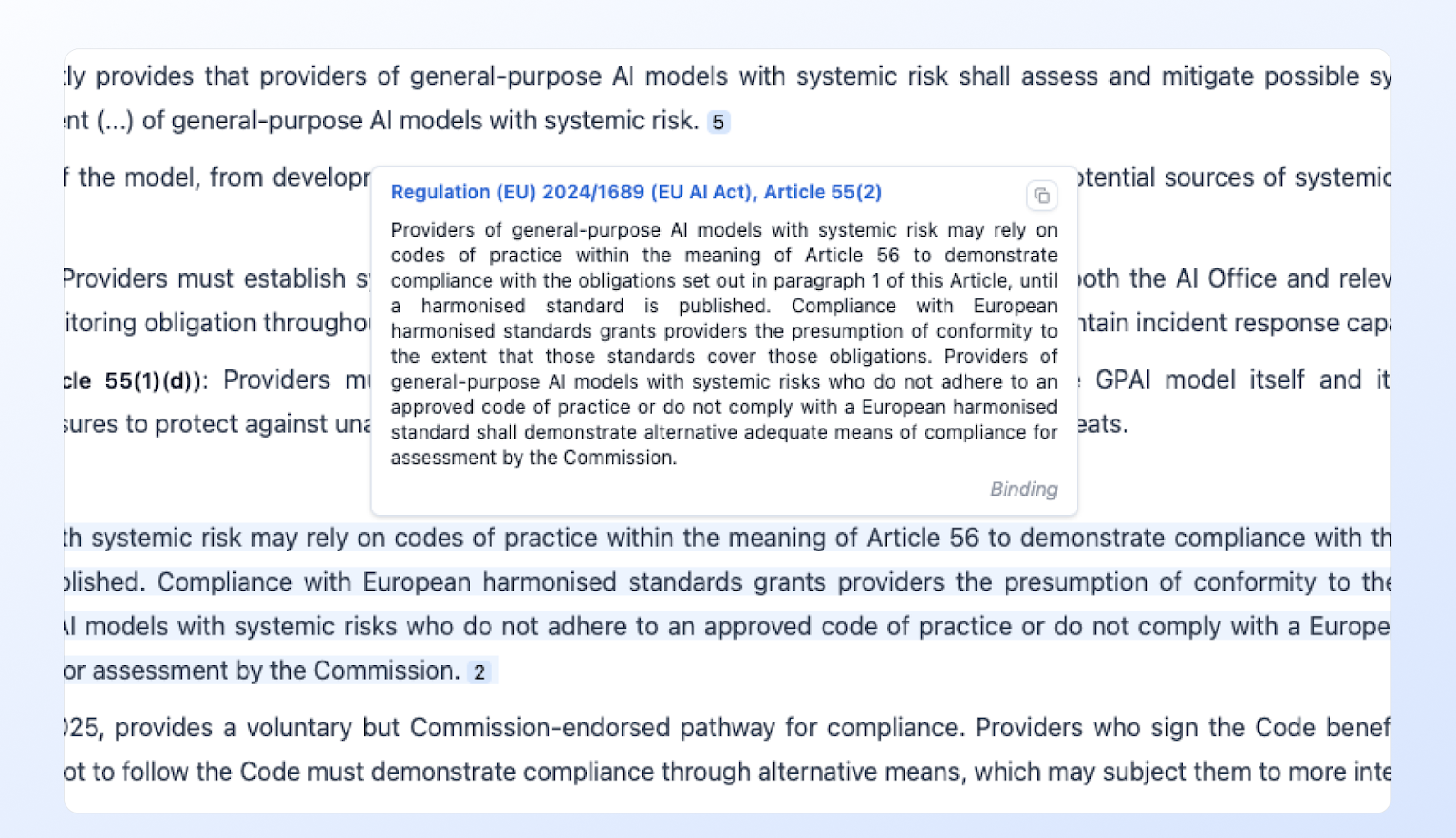Introducing Agentic Legal Research
We are introducing Agentic Legal Research, our most advanced legal research system yet. Our proprietary Agentic Legal Research represents a significant leap in research capability over all our previous tools, featuring state-of-the-art performance across statutory search and analysis, regulatory compliance, cross-jurisdictional and comparative queries, as well as synthesis of multiple primary and secondary legal sources. It is a unified system that knows when to conduct targeted searches and when to deploy deeper research protocols to provide high-level legal analysis to legal professionals. Agentic Legal Research is available to all casepal users, seamlessly integrated within the Assistant to deliver real-time access to authoritative legal sources with transparent research methodology through the reasoning and built-in citations.
Agentic Research unified with Assistant
Agentic Legal Search provides the Assistant with the capability to search and analyse primary and secondary legal sources across the World Wide Web, following legal methodology.
It is a proprietary technology that further creates the framework for researching across different data sources and leveraging tools to provide more effective collaboration for your legal tasks.
Iterative Research Protocols
Following legal methodology and built for legal research, Agentic Legal Research enables the Assistant to access the Web in real-time and follow specific research protocols for finding and analyzing applicable legal sources based on user queries.
When the Assistant determines that your query requires current information or specific legal sources for accurate analysis, it executes a structured three-phase research process:
- Find relevant legal sources - The Assistant conducts three searches at a time, looking for applicable statutes, case law, regulations, and authoritative commentary
- Analyze and evaluate - It reviews whether the relevant primary sources have been found and determines whether additional research is needed to effectively answer the legal question at hand
- Continue searching if necessary - The Assistant performs additional targeted searches until it has gathered sufficient high-quality sources to provide a comprehensive response
This systematic approach is a simplified version of the source-finding protocols that Assistant now operates. These protocols ensure that the Assistant follows a thorough, methodical, and iterative process when accessing primary and secondary legal sources worldwide.
.png)
Access to primary and secondary legal sources worldwide
The Assistant can retrieve information from an extensive range of authoritative sources, including:
- Governmental websites with current legislation
- Official commentaries from regulatory bodies
- Ministry publications
- Parliamentary documents
- Other authoritative public sources containing up-to-date legal information
- Secondary articles and commentaries on legislation
- Widely recognized case law
- Additional relevant sources available on the Web in real-time
When, for example, analyzing GDPR compliance requirements, the Assistant both leverages established knowledge through training data and actively searches EUR-Lex for the official legislation text, retrieves official guidance from data protection authorities, reviews recent governmental and academic commentaries, and synthesizes current information from multiple authoritative sources, all conducted in real-time to ensure accuracy and currency of legal analysis.
This capability enables the Assistant to provide comprehensive legal research that reflects the applicable law and its interpretations by directly working with reputable and up-to-date sources.
Professional applications
Client-Specific Legal Analysis: CISG Application to Drone Sales
Your query: "Does the CISG apply automatically to our client's international sales of small-scale recreational drones?"
How the Assistant approaches this:
Source Identification: The Assistant first retrieves the primary source (CISG text) and identifies Article 2(e), which excludes "ships, vessels, hovercraft or aircraft" from the Convention's scope
Internal Analysis: After finding the exclusion, the Assistant analyzes that the key legal question is whether drones constitute "aircraft" under this provision, noting that the drafters' rationale focused on registration requirements and treatment as immovables
Targeted Research: The Assistant then searches for scholarly commentary specifically addressing whether modern drones fall within the traditional interpretation of "aircraft," iterating through multiple searches to find authoritative secondary sources
Complete legal analysis:
A comprehensive analysis examining both sides of the legal uncertainty: arguments that most commercial drones fall outside the aircraft exclusion (due to minimal registration requirements and movable nature) versus counterarguments about regulatory oversight for larger drones. The analysis includes practical recommendations for contract drafting to address this ambiguity.

Additional Research Applications:
• Compliance Monitoring: "Has the German BaFin issued any new guidance on crypto asset custody requirements since our client's license application in Q3 2024?"
• Contract Drafting: "Find current market standard limitation of liability clauses in SaaS agreements for enterprise customers in the financial services sector"
• Litigation Support: "Our client's patent dispute involves semiconductor manufacturing. What are the current market prices for chip fabrication equipment mentioned in the damages expert report?"
• Due Diligence: "Is there any recent regulatory enforcement action against TechCorp Ltd in the UK that might affect our client's acquisition timeline?"
• Regulatory Intelligence: "What new ESG reporting requirements have EU member states introduced since the Corporate Sustainability Reporting Directive took effect?"
• Transaction Benchmarking: "Find recent M&A transactions in the German renewable energy sector to benchmark our client's €50M wind farm acquisition"
Remember: You can work with jurisdiction-specific research questions in any language.

Additional improvements in Assistant
We have implemented significant updates to the Assistant alongside Agentic Legal Research to deliver enhanced transparency and effectiveness in your research experience.
Enhanced reasoning framework
Reasoning at casepal now includes both Reasoning and Search. When conducting research, the Assistant follows the Research Protocols, which you can observe each phase of their sequential and iterative process:
- Phase 1: Primary Source Retrieval
The Assistant first locates and retrieves the foundational legal sources (statutes, regulations, treaties) that govern the legal question
- Phase 2: Strategic Analysis
The Assistant analyzes the primary sources found, identifies the key legal issues and gaps, and develops a targeted research strategy for finding interpretive guidance
- Phase 3: Interpretive Research
The Assistant conducts focused searches for case law, scholarly commentary, and authoritative interpretations that address the specific legal issues identified in Phase 2

This transparency allows you to follow the Assistant's research methodology, review the specific search queries used, and examine which sources the Assistant accessed during each phase of analysis. Understanding the research process from the inside further enables you to actively instruct the Assistant on what to find or guide where to research next.
Refined citations & display of output
We refined how casepal displays its answers, making explanatory answers easier to read, while maintaining formal display of output for drafting-related tasks.
We have significantly expanded our citation capabilities with:
- OSCOLA Referencing: All sources follow the Oxford Standard for Citation of Legal Authorities for improved consistency and clarity of attribution
- Source Classification: Citations are classified as Primary or Secondary sources to indicate their legal authority
- Direct Source Access: Citations within answers are clickable, providing direct access to the Web addresses where sources were found
- Research Transparency: Sources accessed during the research process are available through "Reading Sources" for verification
- Numbered References: Citations within answers are displayed with clear numbering as [1], [2], … [N] for easier reference

Upcoming capabilities
Current Agentic Web Search focuses on publicly available legal sources, prioritizing governmental websites and primary legal materials accessible through the World Wide Web. Sources requiring specialized database navigation or internal search protocols within government databases are not yet accessible.
Agentic library search
Over the next few weeks, we will be improving Agentic Legal Research Search capabilities by further integrating Library Search functionality. This development aims to create a unified research framework within casepal that operates across both firm-specific data and publicly available legal sources.
This integration will simplify the user experience significantly. Rather than selecting between "Assistant" and "Library Search" modes, you will simply enter your question, and casepal will reason and intelligently determine the appropriate search strategy and sources - whether from your firm's internal Library or the World Wide Web.
Advanced Database Integration
Court database search functionality will expand Agentic Legal Research beyond current web-based protocols to include specialized database environments. The Assistant will extend its capabilities to understand proprietary database structures, navigate specialized interfaces, and conduct targeted searches within professional legal systems. Comprehensive usage instructions will be provided upon release of these expanded capabilities.
Strategic Development Vision
Agentic Legal Reearch represents a fundamental evolution in casepal's functionality. Our proprietary search technology, developed specifically for legal research, creates the foundation for multiple specialized search agents. Future capabilities will include Court Database Search, Library Search, and additional specialized research tools under a unified framework of agentic capabilities in Assistant.
.png)